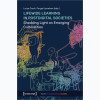Scimification: Holistic Competence Scenario Development and the Example of Virtual Intercultural Escape Rooms and Strategy Games

Chapter
Author(s) / editor(s):
Jürgen Bolten
Year: 2024
Bolten, Jürgen (2024). Scimification: Holistic Competence Scenario Development and the Example of Virtual Intercultural Escape Rooms and Strategy Games. In Conti, L., & Lenehan, F. (Eds.). Lifewide Learning in Postdigital Societies: Shedding Light on Emerging Culturalities. Studies in Digital Interculturality, pp. 29-56. Bielefeld: transcript. ISBN: 978-3-8376-6889-6
Keywords: Scimification; gamification; virtual escape rooms; digitalization; internationalizationLanguage(s): English
Abstract:
Scimificationis is a newly-constructed word composed from the words science and gamification. In terms of content, it describes a realised form of the reciprocal connection between the competence levels of knowledge (cognitive level), ability (conative level) and will (affective level) in digital and virtually-oriented university teaching.The question of whether, and if so, how, science and gamification fit together, arises with particular urgency against the backdrop of the corona-accelerated digitalization movement in higher educational teaching: Should games such as virtual strategy games be taken seriously at all in academic training and further education? Conversely, against the background of significantly changed teaching/learning scenarios, the question arises as to whether cognitive teaching/learning formats, such as 90-minute lectures, remain suitable at all anymore for the initiation and maintenance of sustainable learning. Using the example of interdisciplinary and transnational university cooperation, this chapter outlines how virtual escape rooms and strategy games can contribute to the promotion of holistic competence development processes. They may also stimulate new curricular directions for the methodology-based didactic implementation of digitalization and internationalization.
https://www.transcript-verlag.de/978-3-8376-6889-6/lifewide-learning-in-postdigital-societies/
Post created by: Carmen Pereyra